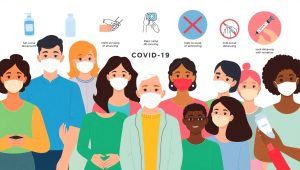
The COVID-19 pandemic has changed the way we live, work, and interact with others. While vaccines and medical advancements have made great strides in controlling the spread of the virus, it is still essential for individuals to remain vigilant and proactive in preventing its transmission. In this article, we’ll guide you through the most important steps to stay safe and prevent COVID-19, providing you with all the information you need to protect yourself and others.
Understanding COVID-19
COVID-19 is caused by the SARS-CoV-2 virus, primarily spreading through respiratory droplets when an infected person coughs, sneezes, or talks. The virus can also spread by touching surfaces contaminated with the virus and then touching the face. Symptoms vary, but common signs include fever, cough, and shortness of breath. In severe cases, COVID-19 can lead to pneumonia, organ failure, and even death, especially in vulnerable populations such as the elderly and those with underlying health conditions.
Key Prevention Measures
- Vaccination: The most effective way to protect yourself from severe illness due to COVID-19 is through vaccination. Several vaccines have been authorized for emergency use globally, and getting vaccinated can reduce the risk of infection and transmission. Booster shots are also recommended, especially in the face of emerging variants, to ensure continued protection.
- Wearing Masks: Wearing masks in public spaces, especially in indoor areas or crowded settings, helps reduce the spread of the virus. Masks prevent respiratory droplets from being released into the air, protecting both the wearer and those around them. Ensure that your mask covers both your nose and mouth properly for maximum protection.
- Social Distancing: Maintaining physical distance from others remains a key strategy to reduce virus transmission. Stay at least six feet away from individuals who do not reside in your household, particularly in crowded environments or areas with limited ventilation.
- Hand Hygiene: Regular handwashing with soap and water for at least 20 seconds is one of the simplest and most effective ways to prevent the spread of COVID-19. When soap and water are not available, use hand sanitizers with at least 60% alcohol. Avoid touching your face, especially your eyes, nose, and mouth, to prevent contamination.
- Avoid Large Gatherings: Limiting the number of people in social settings significantly lowers the risk of COVID-19 transmission. If possible, opt for virtual meetings or outdoor gatherings where the risk of virus spread is reduced. Large indoor gatherings, especially in poorly ventilated spaces, are particularly high-risk.
Know the Symptoms and Seek Testing
It’s important to know the symptoms of COVID-19 and seek medical attention if you experience any of them. Common symptoms include fever, dry cough, fatigue, and difficulty breathing. If you develop symptoms, self-isolate and seek a COVID-19 test as soon as possible to help prevent further spread. Early detection and isolation can play a crucial role in keeping the community safe.
Stay Informed and Updated
As the situation surrounding COVID-19 continues to evolve, it is important to stay informed about the latest health guidelines and updates from trusted sources such as the World Health Organization (WHO) and the Centers for Disease Control and Prevention (CDC). Local health authorities may also have specific recommendations or regulations based on the current situation in your area.